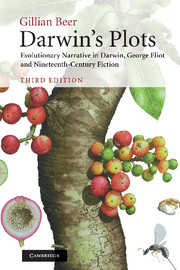Book contents
- Frontmatter
- Contents
- Foreword by George Levine
- Preface to the first edition
- Preface to the second edition
- Preface to the third edition
- Introduction
- Part I Darwin's language
- Part II Darwin's plots
- Part III Responses: George Eliot and Thomas Hardy
- 5 George Eliot: Middlemarch
- 6 George Eliot: Daniel Deronda and the idea of a future life
- 7 Descent and sexual selection: women in narrative
- 8 Finding a scale for the human: plot and writing in Hardy's novels
- 9 Darwin and the consciousness of others
- Notes
- Select bibliography of primary works
- Further reading related to Charles Darwin
- Index
8 - Finding a scale for the human: plot and writing in Hardy's novels
Published online by Cambridge University Press: 04 August 2010
- Frontmatter
- Contents
- Foreword by George Levine
- Preface to the first edition
- Preface to the second edition
- Preface to the third edition
- Introduction
- Part I Darwin's language
- Part II Darwin's plots
- Part III Responses: George Eliot and Thomas Hardy
- 5 George Eliot: Middlemarch
- 6 George Eliot: Daniel Deronda and the idea of a future life
- 7 Descent and sexual selection: women in narrative
- 8 Finding a scale for the human: plot and writing in Hardy's novels
- 9 Darwin and the consciousness of others
- Notes
- Select bibliography of primary works
- Further reading related to Charles Darwin
- Index
Summary
In The Expression of the Emotions Darwin describes fear as a primary emotion whose manner of expression has barely changed over millions of years:
We may likewise infer that fear was expressed from an extremely remote period, in almost the same manner as it now is by man; namely, by trembling, the erection of the hair, cold perspiration, pallor, widely opened eyes, the relaxation of most of the muscles, and by the whole body cowering downwards or held motionless.
Fear is, in the Victorian anthropological sense, a ‘survival’. Like certain primitive tribes, this primitive emotion survives into the modern world unchanged. Like them, it represents the primal conditions of man and allows us to observe those conditions still at work. Moreover, it occupies the same place in the metaphor of development as do ‘primitive’ peoples: fear is an emotion to be controlled, suppressed, outgrown. Reason is cast as an adult emotion, just as western European man is an ‘adult’ on the scale of development. So, like primitive peoples, fear is to be kept under control. Yet like them, it is still there, not fully left behind, nor entirely dominated. In the arc of development, fear is perceived, disturbingly, as at the base. It retains its insurgent power and is liable – like mutiny – to break out.
The effort of empire can be seen in the later-nineteenth-century preoccupation with fear, in a culture which set so much store by courage, or ‘pluck’.
- Type
- Chapter
- Information
- Darwin's PlotsEvolutionary Narrative in Darwin, George Eliot and Nineteenth-Century Fiction, pp. 220 - 241Publisher: Cambridge University PressPrint publication year: 2009



